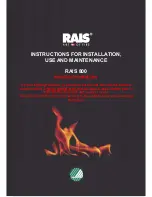
following immediate actions should be taken:
a) Open doors and windows to ventilate the room.
b) Let the fire out and safely dispose of the fuel from the
appliance.
c) Check for flue or chimney blockage, and clean if required.
d) Do not attempt to re-light the fire until cause of fume has been
identified, if necessary seek professional advice.
The most common cause of fume emission is flueway or chimney
blockage. For your own safety these must be kept clean.
Check that :
a) The doors are tightly closed.
b) The air control is pushed in .
c) A suitable fuel is being used.
d) Door seals and air control flap pads are intact.
If the fire is over-fired it will cause premature failure of the internal
fire parts. Overfiring is occurring when any parts of the fire begin to
glow red. To prevent over-firing ensure that:
a) the door seals are kept in good condition, and that the doors are
sealing correctly,
b) the thermostat on the fire is working correctly,
c) a suitable fuel is being used,
d) the fire is not fitted onto a heating system which is too large.
Do not light the fire if there is any possibility that any parts of the
system may be frozen.
Check that:
a) the fire is burning properly - if not then carry out the checks under
"Fire Will Not Burn".
b) the throat plate is fitted correctly (see Fig. 4.) and that it is not
distorted.
c) the door seals are in good condition.
d) If the hot water goes cold when the pump is turned on, or if some
radiators are hotter than others, then the system may need balancing,
the pump may be pumping the water too quickly around the system,
Fire blazing out of control
Over-Firing
Freezing
Lack of Heat To Radiators / Hot Water
or the radiators may need bleeding. Please ask your installer to check
these points.
If the chimney is thoroughly and regularly swept, chimney fires should
not occur. However, if a chimney fire does occur push the air control
in fully tightly close the doors of the appliance. This should cause the
chimney fire to go out in which case the control should be kept closed
until the stove has gone out. The chimney and flueways should then
be cleaned. If the chimney fire does not go out when the above action
is taken then the fire brigade should be called immediately.
After a chimney fire the chimney should be carefully examined for
any damage. Expert advice should be sought if necessary.
If you need further help with your Charnwood
then your
Installer will be able to provide the answers to most questions. Your
Local Charnwood Premier Dealer has a great deal of experience and
will also be able to provide helpful advice. Further help is available
from the Charnwood Customer Services department who will be
pleased to give advice, if necessary.
Chimney Fires
I F YO U N E E D F U R T H E R H E L P
Island
OPERATING INSTRUCTIONS
®
charnwood
I S L A N D
8


































